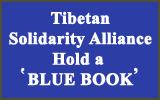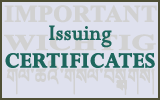Meeting on Strengthening Regional Coordination among Tibet-related Civil Society Organisations Concludes

The three-day event, bringing together all the Tibet-related organisations, i.e., Tibetan Community (TC) groups and Tibet Support Groups (TSG) based in the countries within the Office of Tibet (OoT) London constituency, was attended by a total of 28 participants in total.
Local co-hosts, Swedish Tibet Committee (STC) and Tibetan Community in Sweden welcomed the participants. Mattias Bjornerstedt, chair of the STC, introduced the topics for discussion and chaired the sessions on day one and day two. The four representatives from Central Tibetan Administration (CTA) spoke on topics related to their work: Representative Sonam Frasi highlighted, with appreciation, the important roles of the local CSOs in extending CTA’s outreach capacity; Representative Thinlay Chukki informed about advocacy mechanisms at the UN, the upcoming UPR on China and the importance of inputs from local TSGs in lobbying their governments to pass resolutions at the UN Human Rights Council; Representative Rigzin Genkhang touched on the interconnectedness between local pressure groups at the national level and the EU institutions and the importance of connecting with MEPs at their constituency level to strengthen Tibet advocacy at the European Union in Brussels; and DIIR Additional Secretary Tenzin Lekshey highlighted the relevance of Tibet issue for humanity and the complexities of a pan-Europe strategy on Tibet advocacy. Each participant shared information about their assessment of the local situation, future aspirations, opportunities to be utilised and the challenges faced by their organisations.
Day two ended with a Tibet talk at the Swedish Parliament. Swedish MPs Margareta Cederfelt and Richard Jomshof spoke about their experiences and connections with Tibet and the work of the Swedish Parliamentary Friendship Group for Tibet. Representative Sonam Frasi spoke on the Tibet-China Conflict and Dr Martin Mills of Aberdeen University presented his environmental research work on the Tibetan Plateau and the global impact of Tibet’s environment on climate change – changes on the Tibetan Plateau are 100 years ahead of sea-level and looking at Tibet’s environment is seeing the future of the rest of the world in 100 years.
Day three was only for the TC representatives and CTA staff in which the deliberations focused on some concrete measures that will be discussed further with the members of TCs.
The meeting gave a better understanding of local situations and enhanced relations between the local groups within a country as well as built cross-country partnerships, that already started on day one between a few TSG groups. It also reinforced the feeling of camaraderie between the participants and an enhanced sense of belongingness and ownership of the Tibetan freedom movement. Further, it gave a good level of understanding of the local situation for managing expectations on all sides – among the local groups and between the CSOs and CTA. Most importantly, it strengthened confidence and encouragement in working more effectively on finding a peaceful resolution to the Tibet-China conflict.
Among the participants, there were 8 from TC groups, 10 TSG members and 5 CTA staff. Gender representation was good at 11 females to 12 males. Additionally, 5 Tibetan youths – 2 females and 3 males – living in Sweden participated in the event at the Swedish Parliament. However, friends from Ireland, Estonia and Latvia, could not join this time. Tibetan Community in Sweden hosted dinner for the participants on the third night followed by traditional Tibetan gorshey dances.




